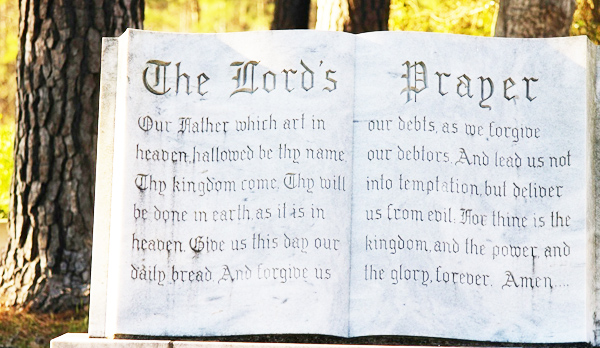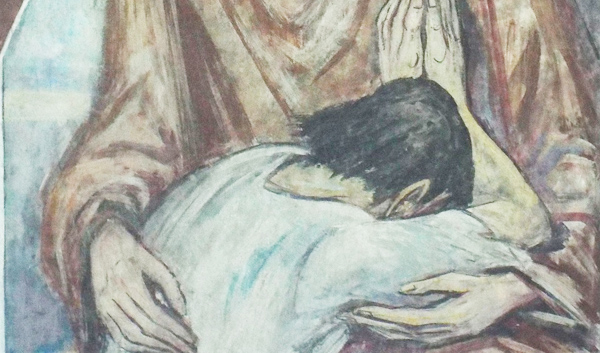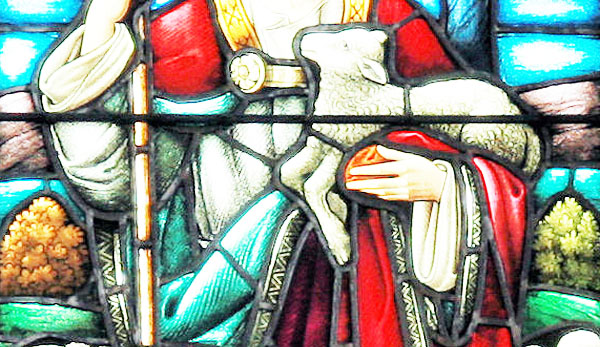Lead us not into temptation (Luke 11:4). (Today’s is the last in a brief series of meditations on the Lord’s Prayer.) James says no one can say God has tempted him; this request, then, is for God to keep us from situations where we might fall. It is a recognition of the dangerous, bait-riddled, sin-inducing nature of this world. If love of money doesn’t get us, perhaps the temptation to fit in with the crowd will.
Devotions
Forgive Our Sins
Forgive us our sins (Luke 11:4). (We are continuing in our brief series of meditations on the Lord’s Prayer.) Jesus teaches us to pray daily (see previous post) for the forgiveness of our sins, assuming (as we ought to) that we have strayed from the mark each day. Sins are sins — they are not merely mistakes, flaws, personality, or “my truth versus your truth.” And every sin is against God ultimately, and so must be dealt with before God (Psalm 51:4)
Give Us Our Daily Bread
Give us each day our daily bread (Luke 11:3). (We continue today in our brief series on the Lord’s Prayer.) The opening requests that Jesus models for us are about God — so like God they are majestic, huge, and inspiring. A lesson Jesus clearly means for us to learn in this prayer is that God comes first, and only when God is first does everything else matter or fall into place. However, the following pleas that Jesus himself places in our mouth are about us — and like us they are daily, mundane, unspectacular.
Your Kingdom Come
Your kingdom come (Luke 11:2). In my last post I began a series of brief meditations on the Lord’s Prayer. The prayer begins with the request for God’s name to be hallowed, followed immediately with the prayer for his kingdom to come. When we ask for God’s kingdom to come, we are reminded that not only is God’s name and glory to come first — but also God’s desires, his will, his purposes, and his authority.
Hallowed Be Your Name
When you pray, say: “Father, hallowed be your name” (Luke 11:2). It is doubtless true that the Lord’s Prayer is routinely abused around the globe every day, mouthed by people who neither think about its meaning, nor would mean it even if they did. This is why Martin Luther referred to the Lord’s Prayer as “the greatest martyr on earth.” It is, as it were, butchered by thoughtless, soulless prayer on a daily basis. However, the other extreme, into which many evangelicals today have fallen (and it’s just as bad) is this: we have largely neglected it!
Be Careful How You Build
“According to the grace of God given to me, like a skilled master builder I laid a foundation, and someone else is building upon it. Let each one take care how he builds upon it“ (1 Corinthians 3:10). Paul emphasizes over and over again that his labors were “according to the grace of God.” In other words, we can only do what God enables us to do. We are only as strong or skillful or successful as God’s grace working in and through us. Have we been blessed to persevere in Christian service for several years or decades? We are
Not a Pep Talk
The Spirit himself bears witness with our spirit that we are children of God (Romans 8:16). Paul is speaking here to Christian believers, to those who have trusted their past, present, and future to Jesus as their Savior and Lord. And Paul reminds Christians that the Holy Spirit within us now gives us the true witness that we are his. The Spirit, it is important for us to recognize, is not lying to us. This is not merely some pep talk that the Spirit gives us, in order to make us feel better:
God’s Thought-Exceeding Power
Paul, in the middle of a praise-hymn to God in Christ, makes the astounding claim that He is “is able to do far more abundantly than all that we ask or think,” because of the power that is working in Christian believers (Ephesians 3:20). God is able! He is able to do what we ask; he is able to do more than we think; he is able to do above all that we can ask or think. And this doesn’t just mean that God is capable of answering more prayers than we are asking; it also means he is answering
Boldness Through the Blood
“[We have] boldness to enter into the holiest by the blood of Jesus” (Hebrews 10:19). Access to the holy God who created us is the most precious commodity in the universe. So precious, in fact, that no person can afford it, can purchase it with any amount of money or sacrifice or even personal godliness. This is the lesson we are meant learn from the Old Testament sacrificial system of worship. The innermost room (the “holiest”) of the temple was where God’s presence was experienced in a special way. Yet the writer of Hebrews reminds us that there is only
Walking With the Wise, Forsaking the Foolish
Forsake the foolish, and live; and go in the way of understanding. (Proverbs 9:6) It is interesting how these two things go together: 1) forsaking foolishness, and 2) living wisely. In order to pursue the way of truth, the way of understanding, you must forsake the company of foolish companions. You can’t have both. You can’t go in the way of understanding, and also keep your foolish friends close by. “Forsake the foolish and live,” and in forsaking the foolish, “go in the way of understanding.” To pursue wise ways of living, you must—you must—forsake the company and counsel of
This Body Is Only the Seed
What you sow does not come to life unless it dies (1 Corinthians 15:36). Paul, speaking here in the context of the resurrection of the dead, compares our earthly body to a seed. The seed must be planted, and die, in order for it to eventually become the full-grown plant. Similarly, Paul goes on in the very next verse to insist, our earthly body is only the bare kernel of what our glorified body will be. This is a stunning analogy, with awesome implications for the afterlife!
God of the Runaway
The same Jesus who teaches us to pray our Father in heaven tells us God runs to meet his children who come to him by faith. So even as you run to God today, when you do, Jesus says you will find that God is running to receive you. Take the parable of the prodigal son. In the beginning, the son wants what he can get from the father:
Green Pastures In Painful Times
He makes me lie down in green pastures. He leads me beside still waters. (Psalm 23:2) While it is true that we all have experienced what we might call “a good day” — when the children are behaving, the sun is shining, our body is healthy, our spouse is agreeable — these blessings from our benevolent God are not unique to believers who have Christ as their shepherd. Even unbelievers can enjoy these things.
You Are With Me
The psalmist famously writes: “Even though I walk through the valley of the shadow of death, I will fear no evil, for you are with me; your rod and your staff, they comfort me” (Psalm 23:4). Francis Schaeffer, in his book The God Who Is There, references a tragic poem found with the body of a 23-year old young woman and drug addict who had committed suicide. The note read:
How Can the Dead Be Raised?
But someone will ask, “How are the dead raised? With what kind of body do they come?” You foolish person! What you sow does not come to life unless it dies (1 Corinthians 15:35-36). Paul, in discussing the truth of the general resurrection of the dead, anticipates some possible queries and objections. Someone might ask, for instance, “How are the dead raised?” This is a good question! Christian, linger here and learn from the heretic.










